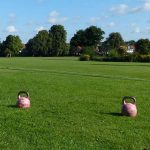Good nutrition and healthy eating habits cannot be underestimated. Not just prior and after training, but what we eat every day. We really are what we eat.
Eating well is essential if you want to avoid chronic illness and weight gain. It is also essential to achieving your goals in fitness and maintaining a healthy lifestyle.
What are the rules about what to eat before and after training?
Before taking part in a training session or work out, it is important to eat for energy and endurance. A useful analogy is fuelling your car before a journey. Why would you want to risk seeing the red fuel light on the dashboard before you had reached your destination? The same applies if you do not take enough food on board before exercise. Hand in hand with nutrition is the unbreakable, golden rule of hydration. Never, ever neglect this essential component, which can have a hugely negative impact on any training regime. I work with lots of clients at Valkyrie who need advice about nutrition and training for their specific needs. I can give professional input for your nutritional requirements and ensure you obtain maximum benefits and potential. This can make a massive difference to performance and gaining the best results from your workouts. Whether it’s for a marathon or weekly functional training, the same principles apply to exercise and nutrition.
Nutrition for pre workout
It is important to eat at the right time, preferably allowing two hours before you start your training. This gives your body time to convert the food into energy. Muscles need easy to digest carbohydrates, such as whole grain bread, brown pasta and rice for quick energy release.
Protein is also essential to transport nutrients and oxygen to muscles.
Aim for low fat, carbs and low fibre. Always stay clear of greasy, fried foods and never be tempted to experiment with something new before a training session. Stick to foods you know you can tolerate and will not cause you problems.
Fluid allows you to perform at your best. Lack of water, when training can affect your concentration levels, compromise your performance and lead to injury due to a reduction in synovial fluid, which protects your joints. A useful little tip to remember, feeling thirsty is a sign your body is not properly hydrated. Drink little and often.
In hot conditions, sports drinks are sometimes preferable, particularly if you sweat profusely, because they provide carbs and sodium. If you are exercising to lose weight, it is better to drink water rather than sports drinks.
Nutrition post workout
The intensity, time and energy expended in training dictates what your body requires after exercise. Fluid replacement will always be a top priority after completing any workout. You need to hydrate your body. Once the fluid has been taken on board, you can have a high carbohydrate meal with protein, which replaces any that was used to meet energy demands during exercise. Protein will help muscles repair and recover more quickly. Protein powders are also a useful energy source post workout and chocolate milk provides a rich source of protein, carbs and B vitamins. Healthy cereals make a good meal because they offer a healthy mix of carbs and protein.
Always remember to give your body time to rest and repair between work -outs and keep the food intake healthy. This will give you maximum performance from your work -outs and help you achieve success.
If you have any personal training requirements, or would benefit from sports massage therapy, please do not hesitate to contact me on [eeb_content]07973 483314[/eeb_content].




